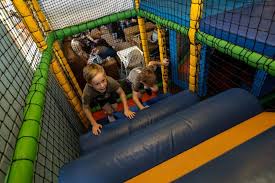
Joyful Adventures: The Magic of Children Playing
The Importance of Children Playing
Play is a fundamental part of childhood that goes beyond just having fun. It is through play that children learn, grow, and develop essential skills that will benefit them throughout their lives.
When children play, they are not just passing the time – they are actively engaging their minds and bodies in activities that help them make sense of the world around them. Play allows children to explore their creativity, problem-solving abilities, and social interactions in a safe and supportive environment.
Physical play, such as running, jumping, and climbing, helps children develop their motor skills and coordination. It also promotes physical fitness and overall well-being. Imaginative play, on the other hand, allows children to express themselves creatively and develop their cognitive abilities.
Through play, children learn important social skills such as sharing, taking turns, and cooperating with others. They also learn how to negotiate conflicts and navigate relationships – all crucial skills for building strong friendships and successful interactions with others.
It is essential for parents and caregivers to encourage children to play freely and explore their interests. By providing opportunities for unstructured playtime, children can discover their strengths, interests, and passions. This kind of self-directed exploration fosters independence and confidence in children as they learn to make decisions and solve problems on their own.
In today’s fast-paced world filled with screens and schedules, it is more important than ever to prioritise playtime for children. By allowing them the freedom to play in ways that are meaningful to them, we are setting the foundation for a lifetime of learning, growth, and happiness.
So let’s celebrate the magic of childhood by encouraging our little ones to play, explore, imagine – because in the world of a child at play, anything is possible!
Exploring the Importance and Impact of Play in Child Development: Frequently Asked Questions
- Why is play important for children?
- What are the benefits of physical play for children?
- How does imaginative play contribute to child development?
- What role does play have in developing social skills in children?
- How can parents encourage and support their children’s playtime?
- What are some examples of age-appropriate games and activities for children?
- Is there a difference between structured and unstructured play, and which is better for children?
- How can technology impact children’s play habits, and what are some guidelines for screen time?
- Are there any safety considerations parents should keep in mind when allowing their children to play?
Why is play important for children?
Play is crucial for children’s development as it serves as a gateway to learning and growth. Through play, children not only have fun but also enhance their cognitive, physical, and social skills. Play allows children to explore their creativity, problem-solving abilities, and imagination in a safe and engaging environment. It helps them develop crucial motor skills, improve their coordination, and promote physical fitness. Additionally, play assists children in learning important social skills such as sharing, cooperation, and communication. By engaging in play activities, children build self-confidence, independence, and resilience that will benefit them throughout their lives. In essence, play is essential for holistic development and well-being in children.
What are the benefits of physical play for children?
Physical play offers a multitude of benefits for children that go far beyond just keeping them active. Engaging in physical activities such as running, jumping, and climbing helps children develop their motor skills, coordination, and balance. It also promotes physical fitness and overall well-being, laying the foundation for a healthy lifestyle. Additionally, physical play allows children to release energy, reduce stress, and improve their mood. Through active play, children learn to explore their physical capabilities, build confidence in their bodies, and develop a sense of spatial awareness. Overall, physical play is essential for supporting children’s growth and development in a holistic way.
How does imaginative play contribute to child development?
Imaginative play, also known as pretend play or make-believe, plays a crucial role in child development. When children engage in imaginative play, they are not just pretending – they are actively using their creativity and imagination to explore new ideas and scenarios. This type of play helps children develop essential cognitive skills such as problem-solving, critical thinking, and abstract reasoning. It also fosters social and emotional development by encouraging empathy, cooperation, and communication with others. Through imaginative play, children can experiment with different roles and perspectives, enhancing their understanding of the world around them and building a strong foundation for future learning and growth.
What role does play have in developing social skills in children?
Play plays a crucial role in developing social skills in children. Through play, children learn how to interact with others, communicate their thoughts and feelings, and navigate social situations. By engaging in imaginative play, collaborative games, and group activities, children learn important skills such as sharing, taking turns, and cooperating with their peers. Play also helps children develop empathy, emotional intelligence, and problem-solving abilities as they interact with others and learn to understand different perspectives. Ultimately, play provides a safe and supportive environment for children to practice and refine their social skills, laying the foundation for healthy relationships and positive interactions throughout their lives.
How can parents encourage and support their children’s playtime?
Parents play a crucial role in encouraging and supporting their children’s playtime. One effective way is to provide a variety of toys, games, and materials that spark creativity and imagination. Creating a safe and stimulating play environment at home can inspire children to explore and engage in different activities. It’s also important for parents to actively participate in their children’s play, whether it’s joining in a game, building a fort together, or simply showing interest in what they are doing. By offering praise and encouragement, parents can boost their children’s confidence and motivation to continue playing. Additionally, setting aside dedicated time for play without distractions can help children focus and fully immerse themselves in the joy of playtime.
What are some examples of age-appropriate games and activities for children?
When it comes to age-appropriate games and activities for children, there is a wide range of options to cater to different developmental stages and interests. For younger children, simple games like peekaboo, stacking blocks, and playing with soft toys can help develop their sensory skills and hand-eye coordination. As children grow older, activities such as puzzles, board games, and outdoor sports become more engaging and challenging, promoting problem-solving abilities and social interaction. Creative activities like drawing, painting, and storytelling encourage imagination and self-expression. It’s important to consider each child’s unique abilities and interests when choosing games and activities to ensure they are both enjoyable and beneficial for their development.
Is there a difference between structured and unstructured play, and which is better for children?
Structured play involves activities that are organised, guided, and often led by adults or set rules. On the other hand, unstructured play is more spontaneous, child-directed, and allows for freedom and creativity. Both types of play offer unique benefits for children. Structured play can help develop specific skills, follow instructions, and learn teamwork. Unstructured play, however, fosters imagination, problem-solving abilities, and independence. The key is to strike a balance between the two approaches to cater to different aspects of a child’s development. Ultimately, both structured and unstructured play are valuable in nurturing a well-rounded child who can thrive in various situations.
How can technology impact children’s play habits, and what are some guidelines for screen time?
Technology can have a significant impact on children’s play habits, influencing the way they engage with the world around them. While technology offers opportunities for learning and entertainment, it is essential to balance screen time with other types of play to ensure children develop a well-rounded set of skills. Guidelines for screen time include setting limits on the amount of time children spend on devices, encouraging active rather than passive screen activities, and ensuring that screen time does not interfere with essential activities such as sleep, physical exercise, and social interactions. By promoting a healthy balance between technology use and other forms of play, parents can help children harness the benefits of technology while also nurturing their creativity, imagination, and social skills through traditional forms of play.
Are there any safety considerations parents should keep in mind when allowing their children to play?
When it comes to children playing, safety is a top priority for parents. There are several important considerations to keep in mind to ensure that playtime is not only fun but also secure for children. Parents should always assess the play area for any potential hazards, such as sharp objects, slippery surfaces, or choking hazards. It’s crucial to supervise young children during play and set clear boundaries to prevent accidents. Additionally, providing age-appropriate toys and equipment and teaching children about safe play practices can help minimise risks and promote a safe and enjoyable play experience for all.


